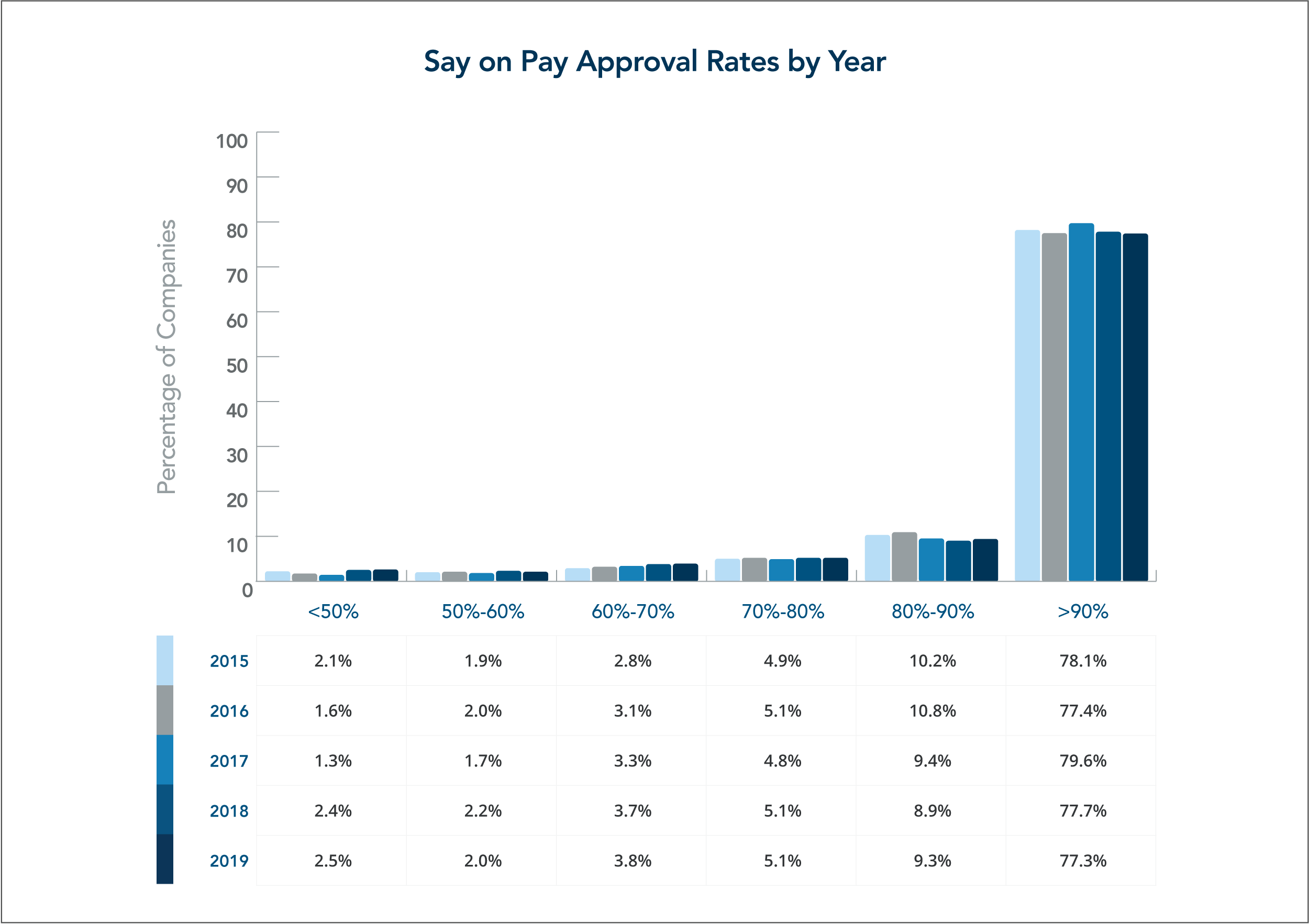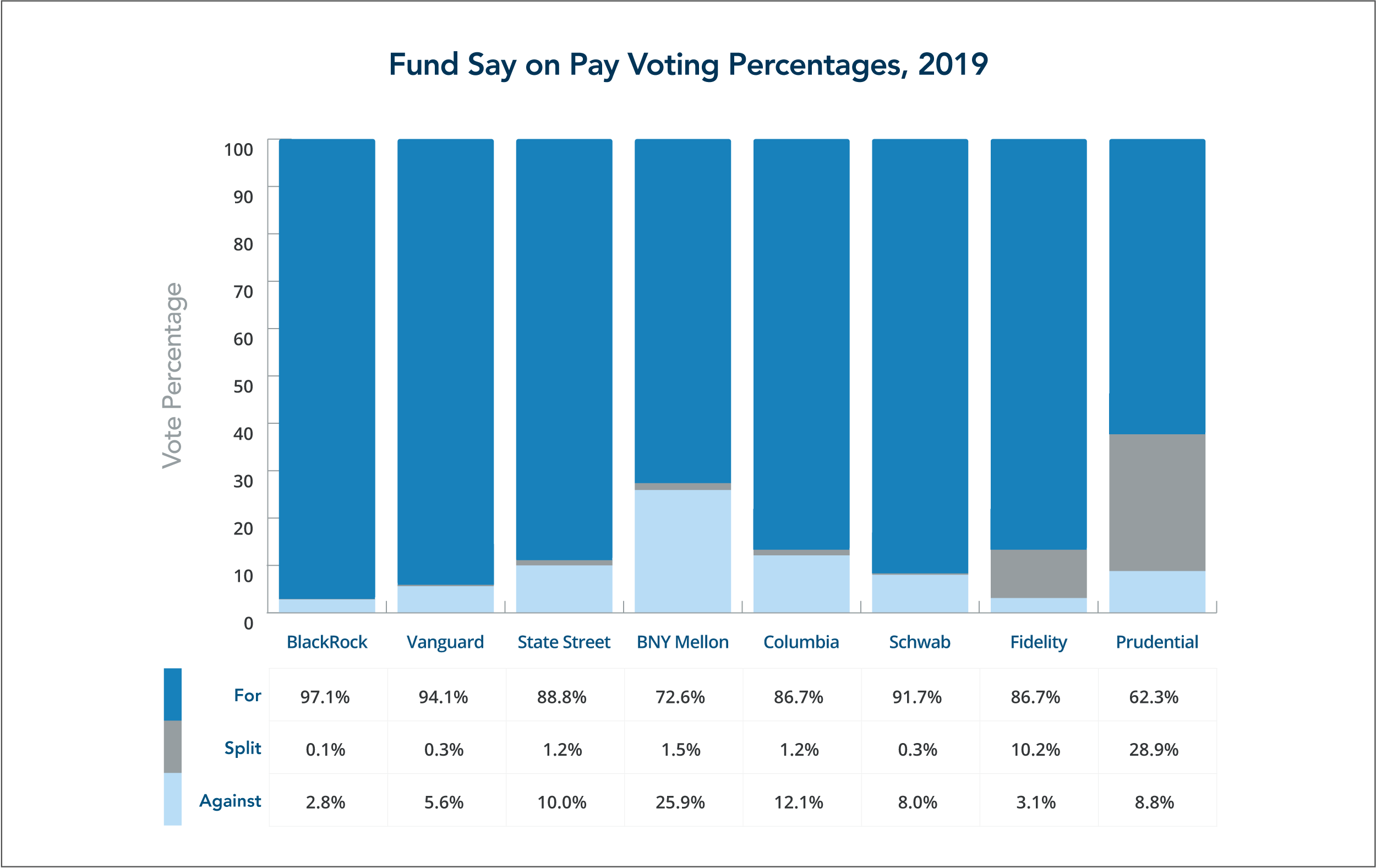Board Committees: With Great Responsibility Comes Great Compensation
March 23, 2020
Nathan Grantz

As companies prepare for the 2020 proxy season, Equilar is revisiting the Say on Pay voting trends of the last five years. Over 75% of companies pass Say on Pay each year with more than 90% support and more than 97% of companies pass overall. The variations seen each year are slight, but overall the trend is towards lower numbers of companies passing with more than 80% approval. This most likely reflects a change in voting behavior, as investors are evaluating compensation packages more rigorously. Routine approval of Say on Pay by most or all investors is becoming less common, and while the largest jump between years is not even half a percentage point, there is a clear trend towards more companies only marginally passing, or even out right failing, Say on Pay votes over the last five years.

An intriguing aspect of the past two years of Say on Pay are the Russell 3000 companies that receive less than 20% of votes in favor. Of the last five years, 2018 and 2019 had far higher percentages of companies with 10-20% votes in favor, jumping from one company in 2017 to four in 2018 and a further increase to six companies with between 10-20% approval in 2019. These changes represent the most extreme cases of the growing number of companies failing Say on Pay. After trending downward from 2015 to 2017, the failure rate jumped back up to 2.4% in 2018 and 2.5% in 2019.
The majority of votes cast in Say on Pay come from institutional investors. The largest funds have trillions in assets under management, and they invest broadly to mitigate risk, which leads to large stakes in many companies. Consequently, their votes have substantial impacts on the results. In 2019, BlackRock ($6.8 trillion assets under management (AUM) )and fellow heavyweights Vanguard ($5.6 trillion AUM ) and Schwab ($4.4 trillion AUM) voted in favor of Say on Pay more than 90% of the time. Of the major funds selected for this study, only Prudential ($1.4 trillion AUM) and BNY Mellon ($1.9 trillion AUM) voted in favor of Say on Pay for less than 75% of the Russell 3000.

Despite the middling number of votes definitively against Russell 3000 compensation plans, Prudential had the lowest number of votes unambiguously in favor of compensation as well. They made up this difference with the highest percentage of split votes. A vote is considered “split” if there is any variation in votes cast by an institutional investor’s constituent funds. As is evident in the above chart, split votes were not a common occurrence, as only Fidelity and Prudential split their vote on more than 1.5% of their holdings in the Russell 3000. On the other hand, BNY Mellon, the only other fund that voted in favor of less than 80% of their Russell 3000 companies’ compensation plans, was resolute in their opposition to those plans. The fund voted against nearly 26% of the plans presented by management.
Overall, in 2019, the majority of the Russell 3000 passed Say on Pay by the huge margins that have come to characterize this regular affirmation of executive compensation. The major funds voted overwhelmingly in favor of the Say on Pay for the largest companies in America, with the lowest absolute approval percentage still clearing 60%. However, there are more companies every year narrowly passing or outright failing their Say on Pay votes, and time and circumstance will tell if the largest funds will side with management indefinitely.
Contact

Nathan Grantz,
Senior Research Analyst at Equilar
Nathan Grantz, Senior Research Analyst at Equilar, authored this post. Please contact Amit Batish, Manager, Content & Communications, at abatish@equilar.com for more information on Equilar research and data analysis.
 Solutions
Solutions













